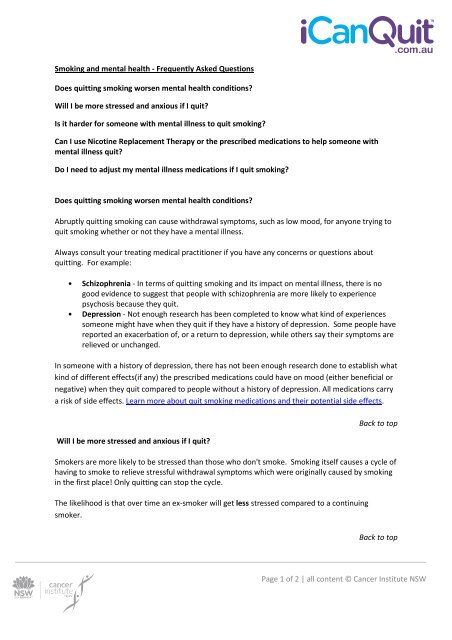Smoking and mental health - Frequently Asked Questions - I Can Quit
Smoking and mental health - Frequently Asked Questions - I Can Quit
Smoking and mental health - Frequently Asked Questions - I Can Quit
You also want an ePaper? Increase the reach of your titles
YUMPU automatically turns print PDFs into web optimized ePapers that Google loves.
<strong>Smoking</strong> <strong>and</strong> <strong>mental</strong> <strong>health</strong> - <strong>Frequently</strong> <strong>Asked</strong> <strong>Questions</strong>Does quitting smoking worsen <strong>mental</strong> <strong>health</strong> conditions?Will I be more stressed <strong>and</strong> anxious if I quit?Is it harder for someone with <strong>mental</strong> illness to quit smoking?<strong>Can</strong> I use Nicotine Replacement Therapy or the prescribed medications to help someone with<strong>mental</strong> illness quit?Do I need to adjust my <strong>mental</strong> illness medications if I quit smoking?Does quitting smoking worsen <strong>mental</strong> <strong>health</strong> conditions?Abruptly quitting smoking can cause withdrawal symptoms, such as low mood, for anyone trying toquit smoking whether or not they have a <strong>mental</strong> illness.Always consult your treating medical practitioner if you have any concerns or questions aboutquitting. For example:• Schizophrenia - In terms of quitting smoking <strong>and</strong> its impact on <strong>mental</strong> illness, there is nogood evidence to suggest that people with schizophrenia are more likely to experiencepsychosis because they quit.• Depression - Not enough research has been completed to know what kind of experiencessomeone might have when they quit if they have a history of depression. Some people havereported an exacerbation of, or a return to depression, while others say their symptoms arerelieved or unchanged.In someone with a history of depression, there has not been enough research done to establish whatkind of different effects(if any) the prescribed medications could have on mood (either beneficial ornegative) when they quit compared to people without a history of depression. All medications carrya risk of side effects. Learn more about quit smoking medications <strong>and</strong> their potential side effects.Will I be more stressed <strong>and</strong> anxious if I quit?Back to topSmokers are more likely to be stressed than those who don't smoke. <strong>Smoking</strong> itself causes a cycle ofhaving to smoke to relieve stressful withdrawal symptoms which were originally caused by smokingin the first place! Only quitting can stop the cycle.The likelihood is that over time an ex-smoker will get less stressed compared to a continuingsmoker.Back to topPage 1 of 2 | all content © <strong>Can</strong>cer Institute NSW
Is it harder for someone with <strong>mental</strong> illness to quit smoking?Not enough research has been done to be able to answer this with certainty.There may be additional challenges faced by someone trying to quit smoking who has a <strong>mental</strong>illness. Extra preparation <strong>and</strong> gaining extra support can therefore be important when you try to quit.Although someone with a <strong>mental</strong> illness may face difficult challenges when quitting, it doesn't meanthey can't quit. Overall, the current evidence available would suggest that someone with a <strong>mental</strong>illness can be just as successful at quitting as those without <strong>mental</strong> illness, despite potential barriersfaced. In addition, 'evidence based' treatments for quitting smoking appear just as effective forthose with severe <strong>mental</strong> illness.Back to top<strong>Can</strong> I use Nicotine Replacement Therapy or the prescribed medications to help someone with<strong>mental</strong> illness quit?Nicotine Replacement Therapy can be used to assist people quit smoking whether or not they sufferfrom a <strong>mental</strong> illness.Some people diagnosed with or who have a history of <strong>mental</strong> illness have said that their doctor hasprescribed Bupropion (Zyban) or Varenicline (Champix), <strong>and</strong> some studies have found the successrate to be similar to that of people quitting who do not experience a <strong>mental</strong> illness. Nevertheless,Varenicline is currently not recommended for people with a significant psychiatric condition as itssafety has not been studied extensively enough to know if there is a likelihood of increased adversereactions in people with different types of <strong>mental</strong> illness.Bupropion can be used in people with depression <strong>and</strong> there is some evidence that Bupropion mayassist people with schizophrenia quit smoking <strong>and</strong> without any increased risk of adverse effects.You will need to have an individual assessment with your treating medical practitioner that takesinto account other <strong>health</strong> problems <strong>and</strong> other medicines used as well as the potential risks <strong>and</strong>benefits of the prescribed medications.Do I need to adjust my <strong>mental</strong> illness medications if I quit smoking?Back to top<strong>Quit</strong>e possibly. <strong>Smoking</strong> has an effect on drug metabolism <strong>and</strong> therefore affects the way somemedications work. When someone with a <strong>mental</strong> illness quits smoking, blood levels of a medicationmay increase or decrease. However for certain antipsychotic medications, blood levels of themedication tend to increase. It is important to let your treating practitioner know that you plan toquit smoking or have quit smoking so they can review your medication dose.Back to topPage 2 of 2 | all content © <strong>Can</strong>cer Institute NSW


